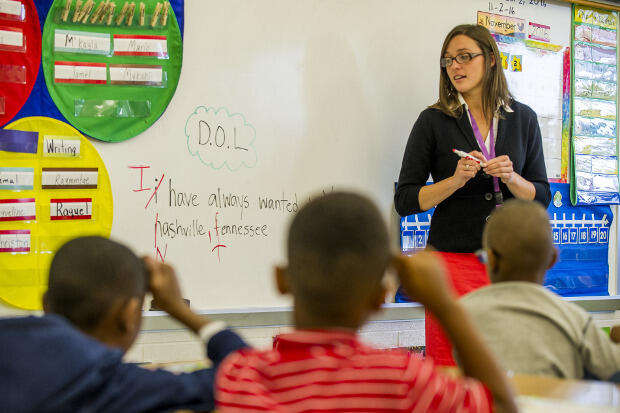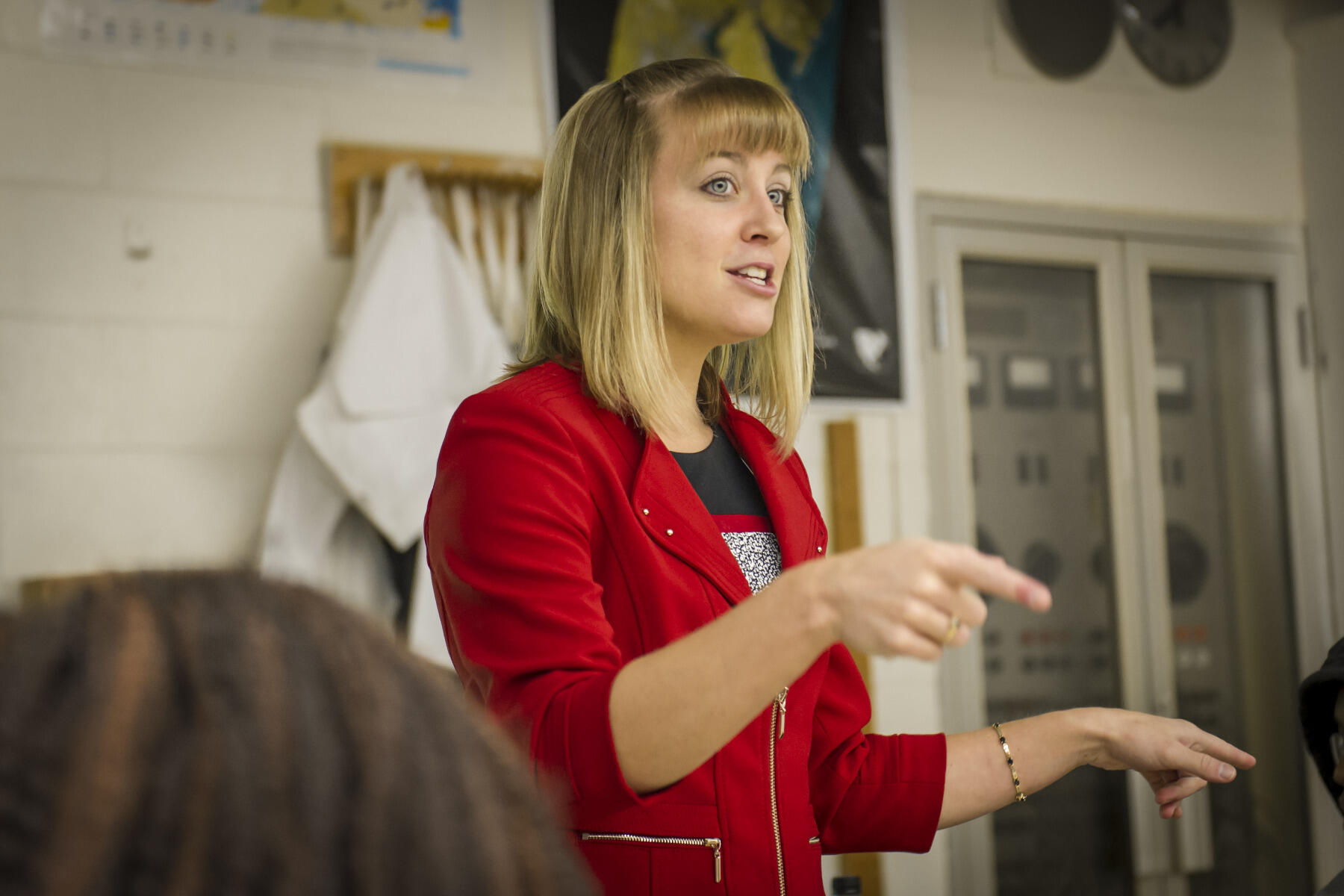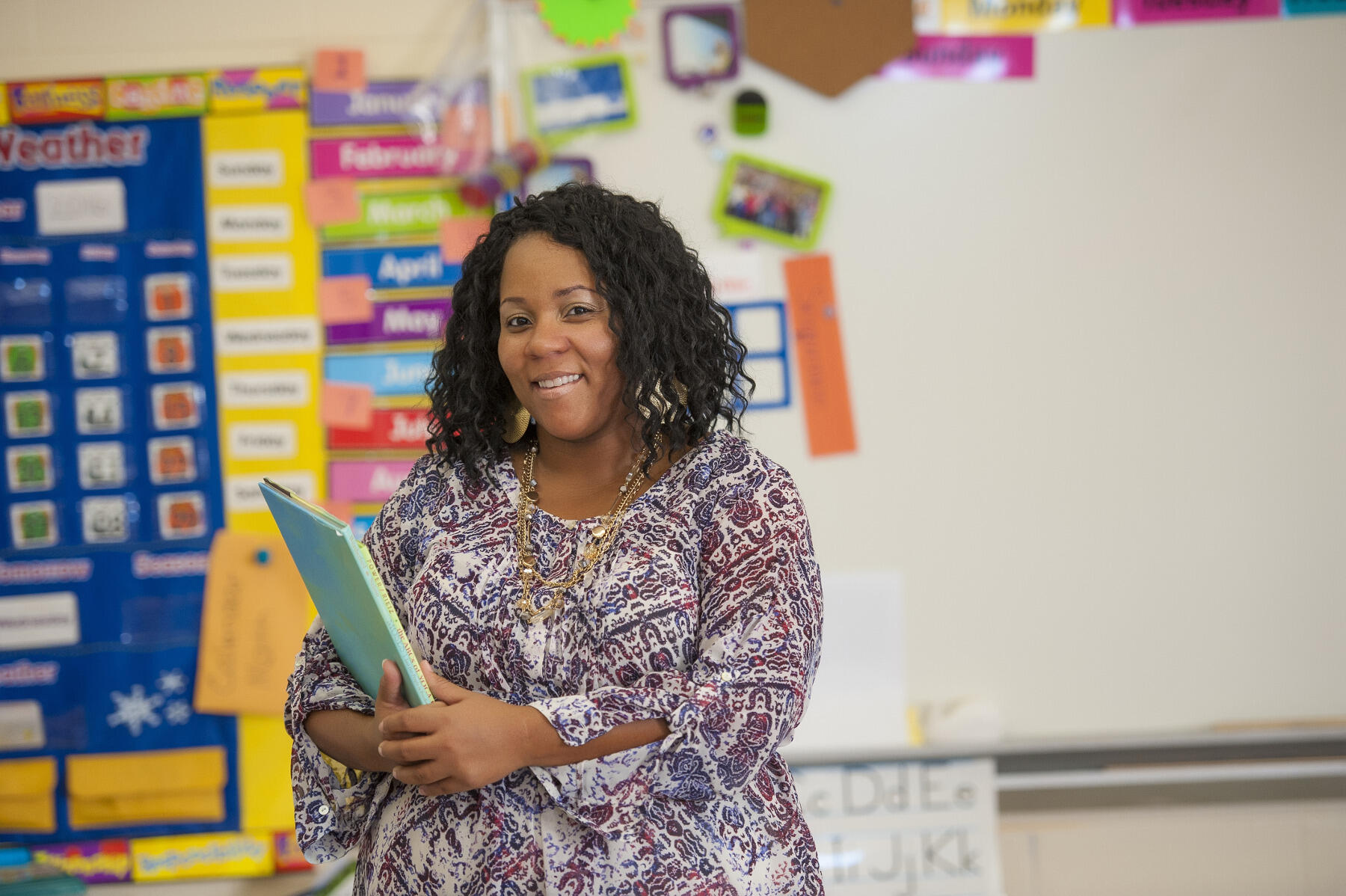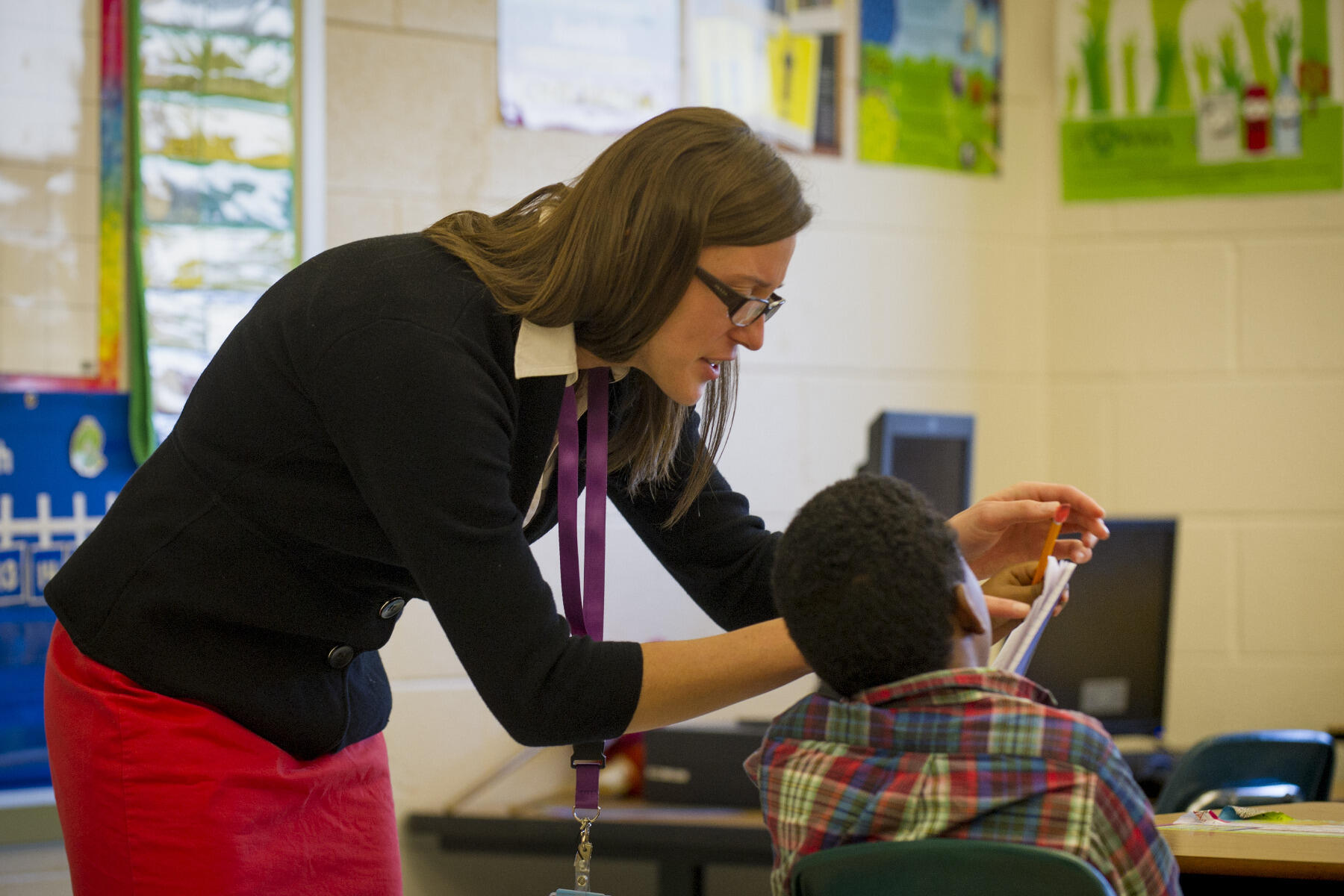
<br>Photos by Julia Rendleman, University Marketing.
Nov. 16, 2016
Teacher Tales: Participants in the School of Education’s Richmond Teacher Residency program share lessons they’ve learned in city school classrooms
Share this story
For the past five years, a partnership between Richmond Public Schools and the Virginia Commonwealth University School of Education has prepared 77 new teachers who have made an immediate impact in 24 of the city’s most challenged public schools.
The Richmond Teacher Residency program is a highly selective urban graduate teacher residency program that aims to create a sustainable pipeline of highly effective teachers who are committed to the students of Richmond Public Schools for the long term.
“Despite overwhelming research that teacher quality is the most important school-based factor in student achievement — and that teacher effects on student learning have been found to be cumulative and long-lasting — poor and minority students consistently are taught by the least prepared, least experienced teachers,” said Therese A. Dozier, Ed.D., director of the RTR program.
“This results in a constant churning of teachers in urban schools that comes with a huge price tag — $6 million each year for Richmond Public Schools, according to the 2014 National Commission on Teaching and America’s Future ‘Teacher Turnover Calculator’ — and, most importantly, the cost to students in terms of the lack of stability in schools and its negative impact on student achievement,” she said.
The RTR program is designed to end these educational inequities. Similar to a medical residency, the teachers co-teach alongside a Richmond Public Schools master teacher for a year, receive extensive mentoring and support, earn a master’s degree in education, and commit to teach at least an additional three years in Richmond Public Schools.
“Teachers who are unprepared in curriculum, teaching methods, child development, and with no student teaching experience leave at twice the rate of teachers who have had this training,” Dozier said.
This fall, there are 29 residents teaching in Richmond schools — nine preparing to be secondary school teachers, seven special education teachers and 13 elementary school teachers — as well as many more RTR teachers who have completed their residency year.
Below, three RTR program participants share their experiences, including how their students are inspiring them in the classroom and beyond.
Lauren Kern

Lauren Kern is in her second year of teaching biology at Armstrong High School. In her first year teaching, she received the Virginia Association of Science Teachers’ Recognition in Science Education Award.
What led you to want to be a teacher?
I am from Pittsburgh, Pennsylvania. I graduated with a B.S. in biology and a minor in English from Bob Jones University in Greenville, South Carolina. Having come from a family of teachers, I never wanted to be one. I saw how much work they brought home every evening, and I wanted no part in that. Many of my teachers and mentors recommended I try teaching, and I still resisted. I was headed for the medical field, and no one could stop that. However, God had other plans for me. When a loan for medical school did not come through, I had no other job available but to teach. And so I stepped into my first biology classroom as a teacher. My first group of students taught me daily to push them harder, expect more from them and, more than anything, to listen to them.
I taught for three years in a private Christian school in the greater Pittsburgh area before moving to Richmond to pursue my master’s in environmental studies at VCU. I have always taught biology with a strong lab focus and some of the labs my students wanted to do required their mentor (teacher) to have a master’s. While completing my master’s at VCU, I began investigating what it would take to earn my education degree. That investigation led me to Dr. [Jacqueline] McDonnough, [associate professor in the School of Education], who recommended the RTR program to me.
What has your experience of teaching in Richmond Public Schools been like so far?
I began the RTR program in 2014 as a part of cohort 4. I was placed at Armstrong High School for my residency year with a master teacher who was in his fifth year at the school. Having taught before, I greatly enjoyed seeing how someone else taught — what strategies he employed, how he responded to student questioning, how he presented ideas I had taught before, but from a fresh perspective.
I remained at Armstrong High School after my residency year and am in my second year as a teacher of record teaching biology.
Through partnerships in the community, we have been able to set up aquaponics to grow strawberries in our greenhouse and an oyster tank to take part in the farm-to-table initiative, and to take part in learning about research at VCU Rice Rivers Center. The oyster tank has inspired “Fish Fridays,” where we study some part of Virginia’s Chesapeake Bay Ecosystem through labs, reading newspapers, studying the economy and learning what role we play in its restoration.
Have there been any particular moments so far in the classroom in which you felt like you really reached your students?
My students inspire me daily.
My students inspire me daily. Their intense desire to learn, to succeed and to understand drive me to engage and explain in ways I did not know existed. I say to them regularly that we are all students in our classroom — and that they are far better teachers than I could ever be.
Our classroom motto is always to “own our own education,” and I am merely there to provide them tools to do so.
While in the final week before SOL re-takes, 10 of my students were tutoring those that were preparing to take the test again. They were taking cell phones from students to keep them focused, drawing diagrams on our white board wall, quizzing them across the room and shouting out terms they needed to know as they passed them in the hall.
One of the students said to me, “We don’t need you now, Miss K. We got this.” And they did. The students they tutored passed.
Six girls that studied together came back to find out if they passed. When I shared with them that they did, one of them smiled and said, “I am so proud of us, guys.”
Antonette Craig-Harris

Antonette Craig-Harris is co-teaching a first-grade class this fall at Woodville Elementary School in Richmond as part of the RTR program’s new elementary track and is pursuing a master’s degree from the School of Education.
Craig-Harris grew up in the Richmond area and worked as a full-time office assistant for Richmond Public Schools’ Adult & Continuing Education office for eight years. She earned her undergraduate degree from VCU in spring 2016 and was accepted into the RTR program this fall.
What led you to want to teach in Richmond as part of this program?
My desire to teach in an urban setting is what led me to the RTR program. Although this is my first semester teaching, it has always been my dream to nurture the academic, social and emotional growth of young people. I have always been passionate about working with children, however I knew that I was not quite prepared to provide the superior level of rigorous yet engaging instruction that RPS students deserve, which led me to applying to RTR. What impressed me most about the RTR was the mentorship and hands-on experience that was made available. The program’s structure ensures I will be able to make a positive impact in the lives of my students.
Have you always wanted to be a teacher?
I will never forget the moment I knew I would become a teacher. I was about eight years old and my mother said to me energetically “Antonette, I want you to teach EJ (my little brother) his ABCs. Not only did I teach my brother his alphabet, but once he began to happily sing his ABCs, I began teaching him how to spell his name, our address and phone number. At that early age I knew that teaching was my destiny.
What has your path to becoming a teacher been like?
At that early age I knew that teaching was my destiny.
The road to becoming a teacher has been full of surprises. The most significant struggle I have faced in my personal and professional life has been my journey to obtaining a bachelor’s degree. After graduating high school, I moved out on my own and began to attend J. Sargeant Reynolds Community College. The trials of working and attending college full-time proved to be too much to bear. I dropped out of college with a 1.8 GPA and placed my dream of becoming a teacher into deferment. During the next several years my life progressed in a positive way — I worked within a public school system, got married and started a family. Life was good, but my earlier failure in community college continued to gnaw at me.
When my daughter was just an infant I decided to restart my education. I am extremely proud to say that while working full time and maintaining a household with a husband and infant, I was able obtain my associate degree. My past GPA of a 1.8 skyrocketed to 3.1! Determined to obtain my bachelor’s degree, I applied to and was accepted at VCU. During sophomore year, just as I was getting acclimated to student life, I learned I had become pregnant with our second child. I was then faced with one of the hardest decisions of my life. How could I possibly work, be a great wife and mother and attend VCU full time, all while being pregnant? The obvious solution was to temporarily delay my coursework. However I was afraid that I would fall into the “mommy-trap,” never to earn my bachelor’s degree and become the teacher I knew I was destined to be.
Against the advice of my husband, academic advisor and professors, I remained focused on my goals — to obtain a bachelor’s degree before my 35th birthday [and become a teacher] — and [I decided to] remain enrolled in my classes.
In addition to dealing with the insecurity of being the oldest student in the class, I was also the only pregnant student. I am proud to say I maintained perfect attendance until the day my son was born. I was so dedicated that I emailed professors from my hospital bed, while having contractions, to let them know that I would not be in class the following day. Against the advice of my doctor, I returned to school one week after the birth of my son and I passed both classes with flying colors. I graduated from VCU in May 2016 with my bachelor’s degree, just five months shy of my 35th birthday.
Now that you’re achieving your dream of teaching, can you share a moment that has stood out and especially inspired you?
Recently, I chose to interview a student [about] behavioral issues for a class assignment. I initially chose a student who was very attentive and well-behaved, however she [ended up not being able to] participate due to testing. I thought I may not get the necessary information from [my second choice], a student who performed poorly in class, but after getting his attention, he wowed me with his skills and ability to think outside of the box to perform the assignment. I have noticed since our interview — when he excitedly told me he’d like to help with my schoolwork — his behavior and performance have improved. I’m proud that my second choice shined brightly. I had no idea this young man cared that I was a college student, and it was touching that he wanted to help me, his teacher.
Grace Giampietro

Grace Giampietro — who teaches third grade special education at Linwood Holton Elementary School in Richmond’s Northside and is known by her students as Ms. G — graduated last spring from Virginia Tech, where she majored in human development and competed as a pole vaulter on the track and field team.
While at Virginia Tech, Giampietro worked as a special education instructional assistant for Montgomery County Public Schools. After graduation, she enrolled in the RTR program’s special/exceptional education track and began pursuing a master’s degree in special education.
What led you to want to teach in Richmond Public Schools through the RTR program?
First, I wanted to earn a master’s degree in the area of special education so that I can better advocate for and effectively educate students with special needs.
Second, I wanted to teach in an urban environment in an effort to change to the cycle of lower academic performances from students who are taught by underqualified teachers in cities across the country. I think the students of Richmond city, and students across the county, deserve high-quality education in order to gain the skills and knowledge needed to thrive in what sometimes are poverty-ridden areas. The four-year commitment I made through RTR and to the city of Richmond ensures that I will remain dedicated to serving the students and families of Richmond city. I will be a constant advocate and resource in the community over the next few years.
Third, the support provided through the administration at VCU, RTR and RPS allowed my decision to join the program to be an easy one. The professors at VCU are constantly working to make me the best teacher I can possibly be. They are experts in the field of special education and are always providing me and my classmates with best-practice instructional strategies to use in our classrooms so that we can be effective as educators. Much as I am for my students, the RTR administration is an advocate for my needs in the public school system.
Finally, the support from RPS, in the form of a clinical resident coach at my school, provides me with a certified and successful teacher to model and learn from each and every day. When I am teaching, I am able to receive immediate feedback from my CRC to improve my instructional methods. I am able to learn the ins and outs of urban education through a master teacher, unlike many first-year teachers.
What has your experience been like so far?
My experience teaching via RTR has been wonderfully rewarding thus far. Although I was a little overwhelmed at first, I relied on my trio of support from VCU, RTR and RPS to guide me. I am building strong rapport with my students and their families, which is a crucial part of the urban education system. I am immediately using what I am learning in one of my classes, TEDU 561, to teach my students how to become stronger readers. While at times I grow tired from being a full-time graduate student (five classes) and a full-time teacher, the progress my students are making each day reminds me that what I am doing is greatly important.
The residency year of RTR is not an easy year. In fact, it may very well be the most demanding year of my life to date — and I say that as a former college athlete. But make no mistake, this experience has done nothing but proven that I am exactly where I am meant to be. The students, families and communities in Richmond need and deserve strong, invested, qualified teachers who are committed to change. I believe I am here for just that reason.
What originally led you to want to be a teacher?
For as long as I can remember, I’ve wanted to be a teacher. I remember begging my teachers in elementary school to let me pretend to be the teacher, if only for five short minutes. It wasn’t until I had the opportunity to work at a school for students with learning disabilities that I found my true calling to be a special educator.
I found that students with special needs are extremely intelligent, eager learners who need support and differentiation to succeed. I knew that I had to find a way to communicate the academic curriculum to my students in a way that makes sense to them, so that they could have the opportunity to shine. Since then, I have been trying to do just that.
Can you tell me about a time when you’ve found yourself especially inspired and proud of the work you’re doing?
In early October, the VCU School of Medicine hosted an event called “Medfest,” where special education students were given free physicals in order to participate in the Special Olympics. Being my first field trip as a teacher, I was ecstatic. Throughout the field trip, my students’ composure on the bus, their bravery with unfamiliar medical faces and their genuine gratitude when given a surprise toy and free lunch filled me with the utmost joy. I was, and am, so proud to be their teacher.
I remember begging my teachers in elementary school to let me pretend to be the teacher, if only for five short minutes.
Subscribe for free to the weekly VCU News email newsletter at http://newsletter.news.vcu.edu/ and receive a selection of stories, videos, photos, news clips and event listings in your inbox every Thursday.
Subscribe to VCU News
Subscribe to VCU News at newsletter.vcu.edu and receive a selection of stories, videos, photos, news clips and event listings in your inbox.









